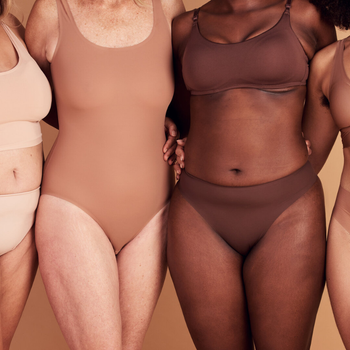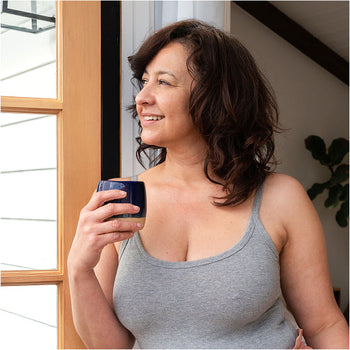Before you know it, you’re drenched in sweat, your skin has a red flush, and it feels like you have a fever. It is an uncomfortable feeling, one that comes often for some when entering the midlife years. Hot flashes can be a challenging aspect of menopause, one that is oft discussed in women's health chats when the concept of the midlife evolution arises. It’s no wonder we are all dreaming of a world where hot flashes are merely a mild side effect of this journey, rather than a focal point.
A part of expertly managing hot flashes is ensuring there is enough support and options for those who experience them. Many menopausal support options involve products with hormones or hormone replacement therapy (HRT). However, hormones aren’t an option for everyone and many like to opt for as natural remedies as possible.
What Causes Hot Flashes?
Hot flashes (or hot flushes, depending on where you're located in the world) can begin in perimenopause, also known as the early stage of menopause, and continue into postmenopause. When your body enters its midlife years, your estrogen levels begin to decrease. This decrease of estrogen levels triggers the body's internal thermostat (the hypothalamus) to become much more sensitive to slight changes in body temperature. This means if your body's temperature drops one degree, the hypothalamus will go into overdrive to regulate your body's temperature. But due to this hypersensitivity, it can overheat your body, thus signaling a hot flash to occur.
Hot flashes can also occur even if you aren't experiencing menopause. For example, breast cancer treatments can lower your levels of estrogen and increase the likelihood of experiencing menopausal symptoms like hot flashes. Hot flashes can be accompanied with sweat, a blotchy red tone on your skin, racing heart, heightened blood pressure, and an overwhelming sense of warmth throughout your body. They can also occur during the evening, in a phenomenon called night sweats. Night sweats are hot flashes that happen exclusively while you are sleeping and often are disruptive enough to wake you. Night sweats can even make it difficult to fall back to sleep afterwards.
Non-Hormonal Treatments and Natural Remedies for Hot Flashes
Our Core Dietary Supplement is the perfect answer to hot flashes. It’s specially developed to treat the 7 most common symptoms of menopause, including hot flashes, mood swings, fatigue, night sweats, brain fog, disrupted sleeping, and stress. It has two plant-powered ingredients that make the formula unmatched: Pycnogenol® and Ashwagandha.
The Core Supplement
Pycnogenol® is a pine bark extract native to the coast of France. It is lauded for its antioxidant value that exceeds Vitamin C by a long shot. It is particularly amazing for managing hot flashes due to its ability to promote healthy blood circulation. It also supports the heart, amplifies immunity, and even makes skin smooth and supple. Pretty amazing, right?
Ashwagandha is the second ingredient in the Core Dietary Supplement that sets the formula apart. Ashwagandha is an adaptogen, which means it helps your body adapt to its highs and lows, returning you to a calm and balanced state. Used for over 3,000 years in Ayurvedic medicine, it is known to reduce stress and boost brain functioning. These two herbs come together in our FDA-approved formula to create an incredible answer to common menopause symptoms.
Vitamin E is also recognized as a key supplement in offsetting mild hot flashes. However, high doses can increase risk of bleeding, so be sure to consult a healthcare provider to determine the appropriate and effective dose. While we’re on the topic of Vitamin E, topical application is incredible for the skin. Our Daily Vaginal Lotion has a nourishing formula designed to tackle vaginal dryness and boasts vitamin E as a nourishing key ingredient.
If you google natural remedies for hot flashes, you're likely to find the herb, black cohosh suggested again and again. Black cohosh is a flowering plant that is used to treat hot flashes and is offered in liquid, pill, and powder form. While it has been lauded for its effectiveness in treating hot flashes, we're not quick to say this is the first remedy to try. Black cohosh can have negative interactions with over-the-counter medications, like Tylenol and prescription medications like antidepressants Paroxetine and Prozac. Furthermore, the side effects of black cohosh can be rather troublesome - upset stomach, cramping, headaches, rashes, weight gain, and vaginal bleeding can all come along with the use of black cohosh. Not fun! A natural remedy that you can easily add to your food is flaxseeds. Plus, flaxseeds also curb vaginal dryness - try adding a handful to your oatmeal.
Soy plant isoflavones have shown efficacy in minimizing the occurrence of hot flashes, though some are sensitive to soy, thus nixing this as an option for relief. If you're interested in this course of action, try out red clover to see if it helps you. The aforementioned antidepressant Paroxetine is an FDA-approved non-hormonal treatment for hot flashes.
Dong quai, also known as the female ginseng, has received some positive feedback from menopausal women when it comes to treating hot flashes. However, a recent study indicates that further clinical trials are needed to truly settle if dong quai is helpful in treating hot flashes. Evening primrose oil is another herbal product that provides support in dealing with hot flashes.
Medical Treatments and Hormone Therapy for Hot Flashes
While we’re covering natural hormone-free treatments, we wanted to equip you with as much information as possible. Hormone-free treatments are a gentle and effective alternative to some of the harsher medical treatments outlined in this section. A medical treatment used for hot flashes is clonidine. This is a pill or patch that is commonly used to treat high blood pressure but can also ease some of the effects of hot flashes. Side effects aren't the best with dizziness, constipation, dry mouth, and drowsiness topping the list of concerns. Another medication used is gabapentin, a nerve-blocking medication that is moderately helpful in treating hot flashes - but it can also cause clouded thinking and drowsiness. Venlafaxine, also known as effexor, is an antidepressant that has shown some clinical success in treating hot flashes.
Women who have experienced a hysterectomy can take estrogen alone. However, for those who have a uterus, it is necessary to take progesterone alongside the estrogen to protect against endometrial cancer. Regardless of which situation you fall under, the hormone therapy needs to be tailored to your needs and this requires expert guidance from a doctor.
Lifestyle Changes to Make Menopause Easier
When thinking about natural remedies for hot flashes, lifestyle changes can be equally useful in decreasing the severity of hot flashes. First off, you'll want to curb your intake of spicy foods alcohol and caffeine - these can be major hot flash triggers.
Be sure to wear breathable fabrics. Cotton, linen, and silk are all natural materials that are light on the skin, thus keeping you cool and comfortable during a hot flash. COVID-19 has mandated the use of masks for all as we work to protect one another - be sure your mask is also in a comfortable, natural material.
Night sweats can be a major stressor. Our Core Supplement targets menopause-induced sleep disturbances, including night sweats. In addition to this supplement, try keeping a damp washcloth with a few drops of eucalyptus oil in it by your bedside. You can lay the washcloth on your forehead and neck to help cool your body down if you're awakened by an intense hot flash.
A balanced diet and exercise regimen is another key in managing hot flashes. Weight loss in those who are carrying extra weight has been shown to decrease the frequency of hot flashes. Plus, developing a strong relationship to a healthy lifestyle is always a plus during the midlife evolution as it will serve as a protective factor against diabetes and heart disease.
Acupuncture has also been clinically proven as an effective treatment for menopause symptoms. The North American Menopause Society recommends hypnosis as an alternative therapy for hot flashes. Mindfulness and meditation is another lifestyle recommendation that can help ease the experience of hot flashes. Receiving psychotherapy, particularly Cognitive Behavioral Therapy (CBT) is useful for all aspects of managing menopause symptoms.
Find community and be mindful of social and emotional support during this time. Menopause can be a a stressful experience but can be even more stressful for those who have already had an impact on their hormone levels, like breast cancer survivors. We've created a Facebook group as a form of social support for women navigating menopause and the midlife evolution. We'd love to have you join us!
Sources:
https://www.menopause.org/for-women/expert-answers-to-frequently-asked-questions-about-menopause
https://www.healthline.com/health/soy-for-menopause
https://www.ncbi.nlm.nih.gov/pmc/articles
https://www.healthline.com/health/dong-quai-ancient-mystery
Continue the Conversation
Leave a Reply
Tags: About Menopause body Dry Skin Fatigue holistic Hot flashes Managing my Hormones menopause 101 Mental Well-Being Night Sweats Physical Well-Being Trouble Sleeping















I am grateful that this post highlighted that it is important that when we are seeking hormone replacement treatment, we speak with a professional. In doing so, we can have confidence that they will administer the right dosage and ensure it is balanced. I will definitely be more mindful when choosing a doctor for hormone treatment.
https://www.siemedical.com/symptoms/hormone-balancing/
— Kristofer Van Wagner